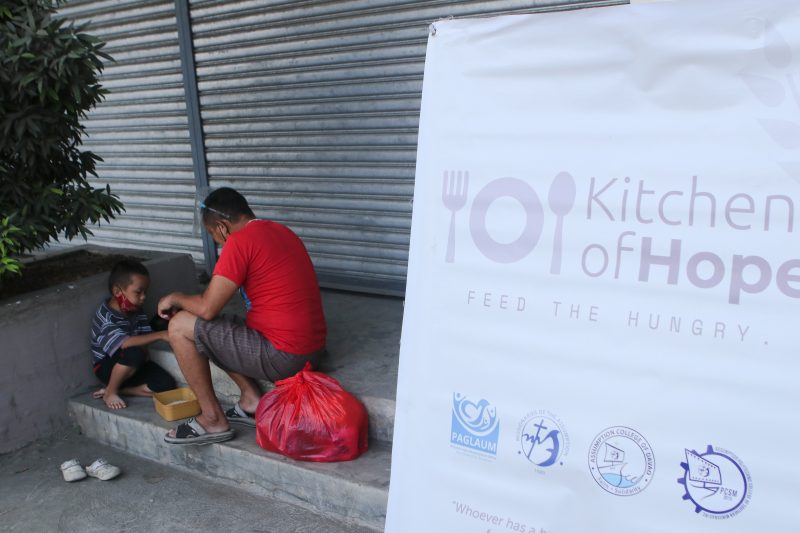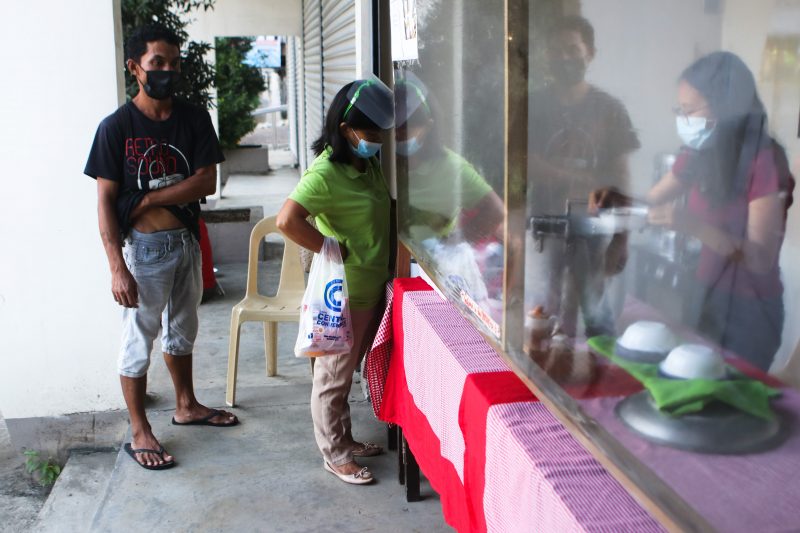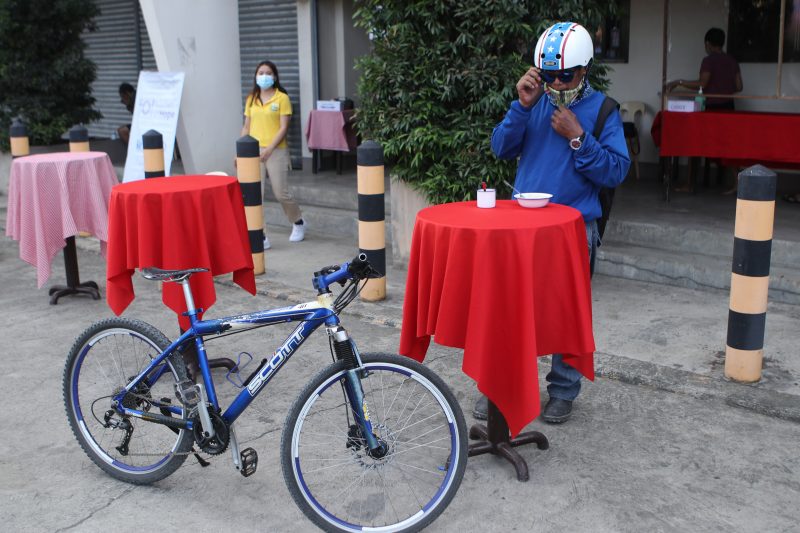 Ronald Flores shares a bowl of porridge with his son Gabriel at the Kitchen of Hope at the Assumption College of Davao along Cabaguio Avenue, Davao City on Tuesday (Sept. 28, 2021). Mindanews Photo
Ronald Flores shares a bowl of porridge with his son Gabriel at the Kitchen of Hope at the Assumption College of Davao along Cabaguio Avenue, Davao City on Tuesday (Sept. 28, 2021). Mindanews Photo
DAVAO CITY (MindaNews / 30 September) – Every morning of Tuesdays and Thursdays, Rolando Flores and his five-year old son Gabriel would walk at least four kilometers just to eat free breakfast served by a volunteer-driven “Kitchen of Hope” along Cabaguio Avenue.
Flores and his son had to endure the morning heat for at least an hour of walk just to fill their empty stomachs.
The 50-year old father used to be a construction worker before the onset of the pandemic last year. However, he lost his job when construction works in the city waned due to quarantine restrictions.
After losing his job, Flores lamented that life has been very tough for them as they have to wander around the city all day long to look for food or any part-time job. Worst, sometimes they would just sleep at night with an empty stomach.
 Volunteers prepare porridge at the Kitchen of Hope at the Assumption College of Davao along Cabaguio Avenue, Davao City on Tuesday (Sept. 28, 2021). Mindanews Photo
Volunteers prepare porridge at the Kitchen of Hope at the Assumption College of Davao along Cabaguio Avenue, Davao City on Tuesday (Sept. 28, 2021). Mindanews Photo
Organized by the Missionaries of the Assumption sisters through its Paglaum Philanthropic Development Office (Paglaum PDO) , the Kitchen of Hope serves free breakfast to people from different walks of life.
Located in front of the Assumption of the College of Davao, the community kitchen, which has been operating since March this year, usually serves a cup of coffee, rice cakes, porridge, boiled bananas or sweet potatoes.
Paglaum PDO director Sister Flora Secuya said the Kitchen of Hope aims to feed the jobless, homeless, public utility vehicle drivers, waste pickers and vendors.
Secuya added that they have noticed that many of those who come to their community kitchen are the homeless and jobless people.
“There are some who would come here for breakfast. Then they would go to the Missionaries of Charity to ask for lunch then go somewhere else for dinner. That’s how hard pandemic hit some of us,” she pointed out.
While the Kitchen of Hope serves free meals, it also offers a “Buy One Share One” option for those only who can afford to pay P40 for every meal.
For every P40, Secuya said, half of it covers the other set of meal for the others.
The community kitchen, Secuya said, was inspired by the charity efforts to feed the homeless in Scotland.
“Our ultimate vision for this Kitchen of Hope is that the homeless people will soon run this initiative and feed the hungry,” she said in an interview.
The ingredients used in preparing the food, she said, were produced by their community partners in Paquibato District of this city.
Moreover, the community kitchen is the congregation’s offering to the 500th anniversary of the coming of Christianity in the Philippines.
“Through our community kitchen, we are also helping our farmers in our community partners because we are buying their farm produce twice the price compared to local traders,” Secuya explained.
For instance, local traders buy cardava bananas for just P5 per kilo at the community, she added, “while we are buying it for P10 per kilo.”
Volunteer Ruffa Mae Elegino, a third year social work student of ACD, said the Kitchen of Hope opens at 7am until 10am.
However, there are times that the community kitchen would already close before 9am if they run out of food.
“There are times that we are already done before 9am because of the volume of people coming here to eat,” the volunteer added.
Elegino said they are preparing around 40 sets of meals every day. “We don’t want to prepare more because it might get spoiled if only few people would come.”
She and about 12 other student volunteers take turns in manning the community kitchen.
Aside from walk-ins, the volunteers are also calling out passersby to avail of their free meals.
“We have regular diners here. Sometimes they are already here ahead of us and wait for us while preparing to distribute the food,” Elegino bared.
 A biker prepares to eat at the Kitchen of Hope at the Assumption College of Davao along Cabaguio Avenue, Davao City on Tuesday (Sept. 28, 2021). Mindanews Photo
A biker prepares to eat at the Kitchen of Hope at the Assumption College of Davao along Cabaguio Avenue, Davao City on Tuesday (Sept. 28, 2021). Mindanews Photo
Among the regular diners at the Kitchen of Hope is Flores, a Badjao shoe vendor in his 50s.
According to him, he dines at the community kitchen every morning of Tuesdays and Thursdays. “Sometimes my Papa would come with me to eat here before we go around to sell shoes” Musa, who lives in nearby coastal community, said.
Meanwhile, as soon as they were done eating a bowl of porridge, Flores and his son picked up their plastic bag filled with food containers.
“We’ll go to the nuns at the Missionaries of Charity to wait for our lunch and dinner. Many others who are like us are also waiting for food there,” he said.
Volunteer Rosalinda Cabataña said some are actually bringing food containers because they prefer to eat at their workplace.
“Maybe they’re just too shy to ask for more. But if they’ll ask for food that they can bring with them, we’ll give it to them,” said Cabataña, a third year college student at ACD.
For Secuya, the community kitchen has like become a convergence of people who are in need in this time of pandemic. “Here you will learn from these people their different stories of survival during this pandemic.”
But she is grateful for all those who have supported the Kitchen of Hope saying that this has shown the generosity of many people. (MindaNews)
